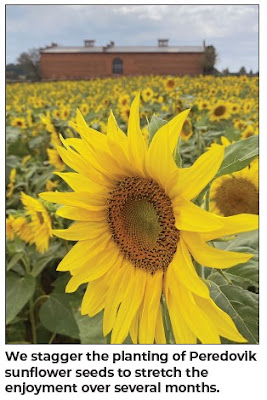The love affair goes way
back.
I’ve always loved digging in the dirt. Maybe it’s the
agrarian roots on my mother’s side. Her daddy and his daddy and his daddy
walked a thousand miles behind mules. Little wonder I had to have a mule or two
or three in my barnyard.
If ink hadn’t been injected into my veins, I might have
been a farmer, too. And I came close one time. When Pam and I married in
college, her father made a pitch, “How about y’all move to the farm, and we’ll
open a dairy?” For about 60 seconds, I tossed around the idea. Since cows must be
milked twice a day for 365 days a year, I said, “Thanks, but I’m thinking of
something else.”
But I wasn’t going to be happy until I bought my first tractor and started plowing some soil. The tired Ford 600 sits under a shelter. The mid-1950s machine is dwarfed by the diesel Kubota sitting next to it. One day, I may trade the orange tractor, but the gray and red one will stay put, for sentimental reasons.
Back in the 1990s, I wanted to grow a small patch of
cotton. Georgia Ag Commissioner Tommy Irvin had to sign off. I got an education
on boll-weevil prevention. Another time, I tried my hand at peanuts. Pam grew
up on a peanut farm, so she was my adviser. Then we discovered raised beds for
vegetables, and that led to a small fruit orchard, including blueberries, thornless
blackberries, raspberries, grapes and kiwi.
All that was fun, but it took more time than my day job
would allow. When I was making annual 50,000-mile jaunts over four states, we
settled for a simpler crop—sunflowers. That’s when I learned there were dozens
of varieties. And, yep, we planted every kind that I could find. One year, it
was about 50.
Along the way, I discovered that we weren’t the only ones
who loved sunflowers. I think deer hide in the woods and watch. When I break
out the sunflower seeds, they start salivating.
This season, we’ve planted sunflowers three times. The
third crop was our best-ever, and I have decided why. We didn’t plant in rows. Instead,
we broadcast the seeds. My friend and helper, Adam, asked, “How many are we
going to plant in this plot?” I said, “Every seed in that bag.” And then—with
the rotary tiller on the tractor—we lightly worked in the seeds, with the
19-19-19 fertilizer, and prayed for a gentle, soaking rain.
After we experimented with a “thick-as-the-hair-on-a-dog’s-back”
trial, the sunflowers sprouted and choked out competing weeds. When the plants
were knee-high, I mowed around the edges—sacrificing a few sunflowers—to whack
down the cussed Amaranthus or pigweed that had benefited from the sunlight.
Last week, I noticed a truck by the side of the road. A
couple was taking pictures of our sunflowers. I stopped and introduced myself
to Mike and Karen Duhlstine of Florida. The retirees were effusive in their
praise, so I climbed the fence and clipped them a bouquet.
As the three of us chatted, a lady slowed her SUV to
yell, “They’re beautiful!”
Sunflowers put smiles on faces. That’s why we grow them.
And besides, Mark Twain once said, “I could live two
months on a good compliment.”
I can, too.
How about you?


